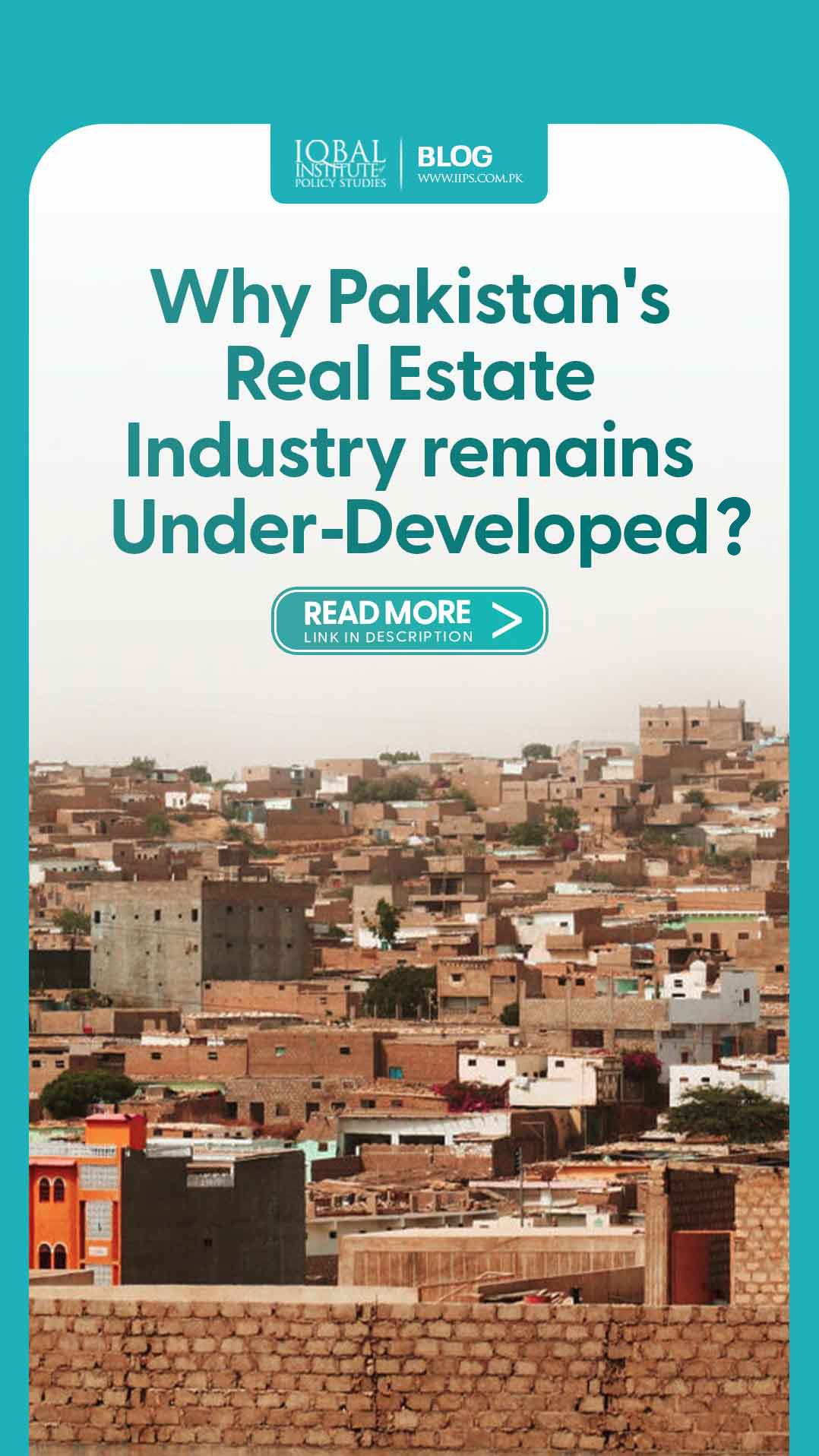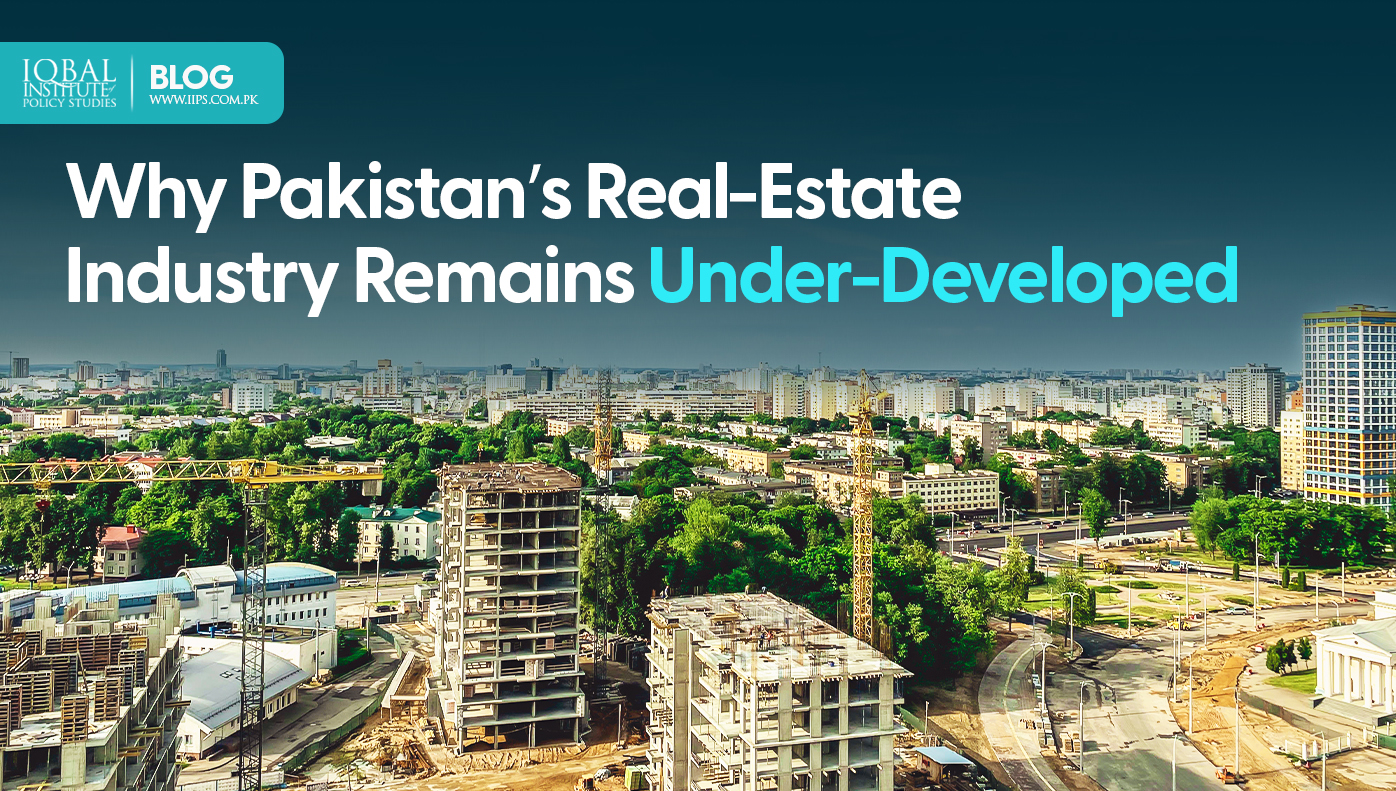Importance of the Real Estate Industry
As a general term, real estate is the built environment (providing all basic facilities), which plays an important role in all aspects of the economy, society, and the environment. A well-operated real estate market would create an exquisite balance between the supply and demand of infrastructure by efficiently locating them. Housing supply must be feasible and affordable to meet the needs of various income strata, either high or low levels. In the last decade, Pakistan has seen tremendous growth in the demand for modern urban infrastructure, i.e., sprawling housing schemes, shopping, office plazas, and leisure lifestyle. The real estate market is imparting a critical role in economic growth. As the construction sector contributes up to 380 billion PKR in GDP, and assets of the real-estate sector contribute 60 to 70% of the country’s wealth. After agriculture, it is the second-largest sector that generates employment. Moreover, it also stimulates the demand of 400 construction industries.
Why The Real Sector is Underperforming?
The real sector of Pakistan has the potential to increase economic growth on similar grounds as the United States real estate market is contributing $30 trillion, which is 150% of the GDP. Whereas Pakistan’s real estate is considered unproductive and a hub of black money hoarders. There is a misconception about the sector that investors would get a massive return on investment. In reality, the real estate sector is dysfunctional due to the reasons mentioned below:
Mis-pricing of a Property
The real estate sector is lacking in an efficient pricing mechanism. Pakistan follows the traditional price-setting mechanism where the Deputy Commissioner’s Office sets the price, called the DC rate. For example, if a plot’s price is Rs 28 million, the Deputy Commissioner (DC) sets its price up to 0.2 million, which depicts a clear discrepancy and increases the opportunity for rent-seekers and an avenue for the black economy.
Lengthy Procedures
Development authorities follow different procedures and regulations for selling and buying properties. The rules and regulations in Cantonments are different from Civic areas. To buy a property, a person has to take an allotment letter from the Divisional Authority, and this process is time-consuming because land recordkeeping is outdated and manual in Pakistan. Hence, it increases the cost of the project.
For instance, obtaining permission for residential construction from Capital Development Authority is comprised of 53 steps and will take 9 months and increase construction cost by 5%; obtaining permission for High-rise building construction from Capital Development Authority is comprised of 104 steps and will take 4 years and increases 77% of the project value; and acquiring a plot in a Private Housing Society is comprised of 72 steps and will take 18.5 years and increases 108% of the project value.
Single-Family Units
The real estate sector of Pakistan focuses mainly on the development of single-family homes, and investment in vertical houses is little, leading to an increased shortage of houses. As single unit houses occupy more area and high-rise residential buildings will be built on a smaller land area. The vertical expansion would help less disruption of natural resources and provide better accommodation to the people.
Lack of Information
The real estate sector is a cash-based economy, and in Pakistan, people prefer to save money instead of investing in property by considering it more profitable. This exists due to a lack of awareness about the investment opportunities, just like the stock market.
Undocumented Taxpayer
A large portion of Pakistan’s economy is undocumented. Undocumented taxpayers can buy high-end commercial property. Because of the hidden assets, they are reluctant to participate in the healthy real estate market.
Mafia and Digitization
Land Mafia creates hurdles for the government to digitise the land record system. The survey (of cadastral mapping) stated that land-mafia has encroached on state and forest land of approximately Rs 5595 billion and Rs 1869 billion, respectively. If the real estate sector gets digital transformation, it would increase transparency and reduce the chances of corruption.
Lack of Authentic Property Listing System
The verified and authentic property listing attracts buyers and sellers. Buyers would get a clear picture of what he/she will get, and sellers would also get benefits. The property listing is not being operated efficiently in Pakistan, which leads to increased transaction costs for buyers. Pakistan can follow the model of Zillow, which provides the whole lifecycle from owning to living in a home, such as buying, selling, renting, financing, remodelling, etc. Zillow holds a database of more than 110 million U.S. homes, comprised of homes for sale, rent, not currently in the market, estimated homes’ value, etc.
Finance and Mortgage
Housing Building Finance Company (HBFC) is responsible for providing loans for the residential property. The process of ac loans is quite elaborative. First, the finance would only be provided if it is spread over 100 Kanal, and secondly, the investor has to fill out many forms and documents that discourage them from investing. However, mortgage financing is 0.5% of the GDP in Pakistan, whereas it is 10% in India. As per findings of one of the leading mortgage finance companies, Meezan Bank Ltd (MEBL), due to high-risk assets, investors are reluctant to take mortgages, and in 2016 MEBL disbursed only 3 billion as a mortgage.
Recommendations
If the property, registration, tax, record keeping, and retrieval system is more customer-friendly, then it would increase the revenue of the local and provincial governments. This would reduce the informal market by providing all information. The property gets registered as per DC rates and if the government abolishes it. The stamp duty rate would increase the overall cost of a property. If investors want to buy land at the market rate, stamp duty must be reduced, and preferential rate schemes introduced.
To help lower and middle-class people participate in the real estate market, the State Bank of Pakistan can introduce the criteria to facilitate the people acquiring mortgages and increase the (Loan Value) ratio with a longer repayment period. The concept of the Akhuwat Foundation can be uplifted, and government can encourage financial institutions to provide interest-free loans for the building of the houses.
The size of the informal and undocumented economy is half of the GDP. If the government put efforts into bringing it into the under-documented net, it would increase the tax collection. FBR can act as a facilitator, making the process easier for the new venture to get registered. The digital transformation of the business registration would improve efficiency and reduce the informality in the sector. Let’s take the example of Guatemala; after introducing the online registration process, business registration has increased up to 40%. It increases transparency as company information can easily be retrieved for audit and regulatory purposes.
Conclusion
The real estate sector has the potential to increase the economy’s growth. The fundamental fixation needs to be done, such as reforms in transparent pricing, proper dissemination of information, digitisation of the sector, improved mortgage framework, and an equitable taxation regime that will increase the investment in the real estate sector.
Key Takeaways
- The construction sector contributes up to 380 billion PKR in GDP.
- Real Estate assets contribute 60 to 70% of the country’s wealth.
- Real Estate is the second largest sector that generates employment.
- The real-estate sector is underperforming because Deputy Commissioner is setting the non-competitive price of the asset, lengthy registration procedures, Mafia hinders the process of digitisation, undocumented taxpayers are not investing, lack of a property listing system and people are not taking loans to construct houses.
[/fancy_box]



Leave a Reply